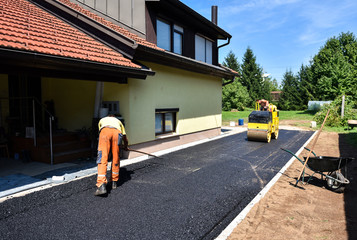Tips For Driveway Repair
If you are experiencing cracks in your driveway, you may want to consider repairing them. Cracks that are wider than a quarter of an inch may signal a more serious problem. Roots may have grown beneath the concrete, or a leaky pipe may have caused the slab to erode. Depending on the cause, you may have to replace your entire driveway or patch it up. You can save money and avoid having to pay to have the entire driveway replaced. Here are some tips for driveway repairs.

Cracks can be caused by poor subgrade prep. Concrete mixes can cause cracks due to shrinking when curing. Cracks can also occur because of general wear and tear. Other issues include gas, oil spills, and stains from salt. The damage to an asphalt driveway can also be caused by excessive heat, grease, and gas. These substances can cause damage to the surface and may also lead to potholes. Driveway Repair is necessary to avoid more severe damage to your driveway.
The quality of the concrete mix is a key factor in the durability of a driveway. Excess water may weaken concrete and cause it to shift. Oil and grease spills can also cause concrete slabs to shift. Only a professional can repair the driveway after the repairs are complete, and the driveway can look brand-new again. If the problem persists, you can resurface the driveway with a new layer of concrete and add decorative touches.
Crack Filler. If you have a crack not more than a half-inch wide, you can apply a patch of crack filler. This self-leveling product will prevent the sealant from showing the crack beneath. It will need at least four to eight hours to cure. Crack Filler is available in tubes and can cost from $2 per quart to $3 per tube. Crack Filler is also available in a rope-like formula, a great way to fill small cracks or pits in your driveway.
Before applying water-based driveway repair material: if you plan to apply water repair, allow the area to dry completely. Otherwise, water will seep into cracks in the asphalt.
- Make sure the driveway is completely dry.
- Please wait for a day or two before applying it. If you apply it in the summer, you should allow at least 24 hours to dry before driving on it again.
- Apply a sealant to protect the area from re-evaporation.
A crack-filling service costs about $100-$400 per square foot. Patching a driveway will cost you between $2 and $3 per square foot. A squeegee and a concrete sealant are required for this service. A structural engineer will be required to evaluate the condition of the driveway. If the cracks are larger than the driveway’s surface area, you may need to resurface the driveway. It will cost about $500-$1,000 to fix a crack in an asphalt driveway.
Crack repairs should be done on a dry day when there is no forecast of rain within 24 hours. Once the crack has dried up, sweep out the cracked section of the driveway to remove any debris and other debris. A flat-head screwdriver is also helpful in clearing out debris inside the crack. Small cracks less than half an inch should be filled with Advanced Polymer Concrete Crack Sealant. This concrete crack filler can be dispensed with a standard caulking gun.
Cracks can be a warning sign of more severe issues. Large cracks allow water to seep in and can cause additional damage in freezing areas. The water will freeze and thaw, causing even more damage underneath the surface. Occasionally, the cracks may be so extensive that resurfacing the entire driveway is the only option. But, if you can’t afford a complete replacement, there are some minor things you can do to repair the damage yourself.
Resurfacing your driveway is a good idea if the crack is less than a quarter of an inch. Resurfacing will require scraping off the damaged section and pouring on a fresh layer of concrete or asphalt. Although resurfacing is more extensive than patching, it is far cheaper than removing and replacing the entire driveway. There are many driveways, so it’s important to research the type of repair you need.
